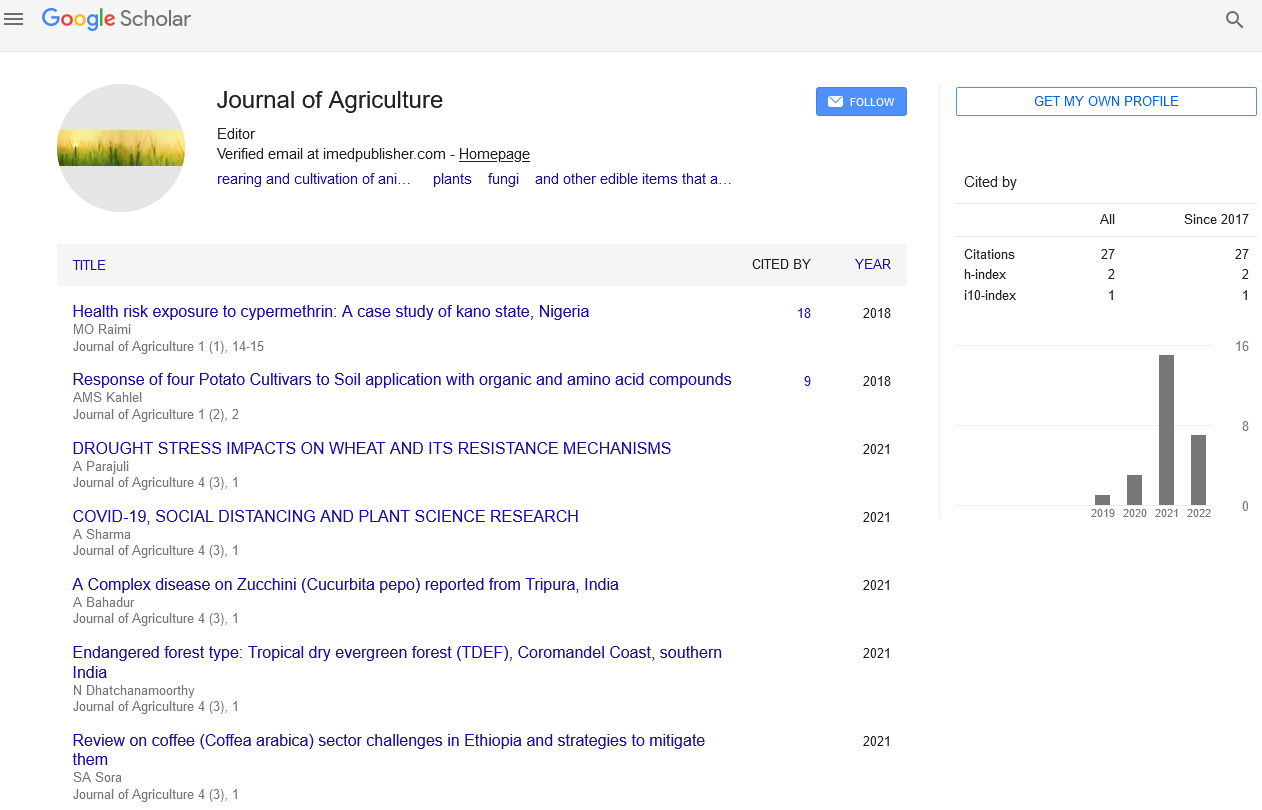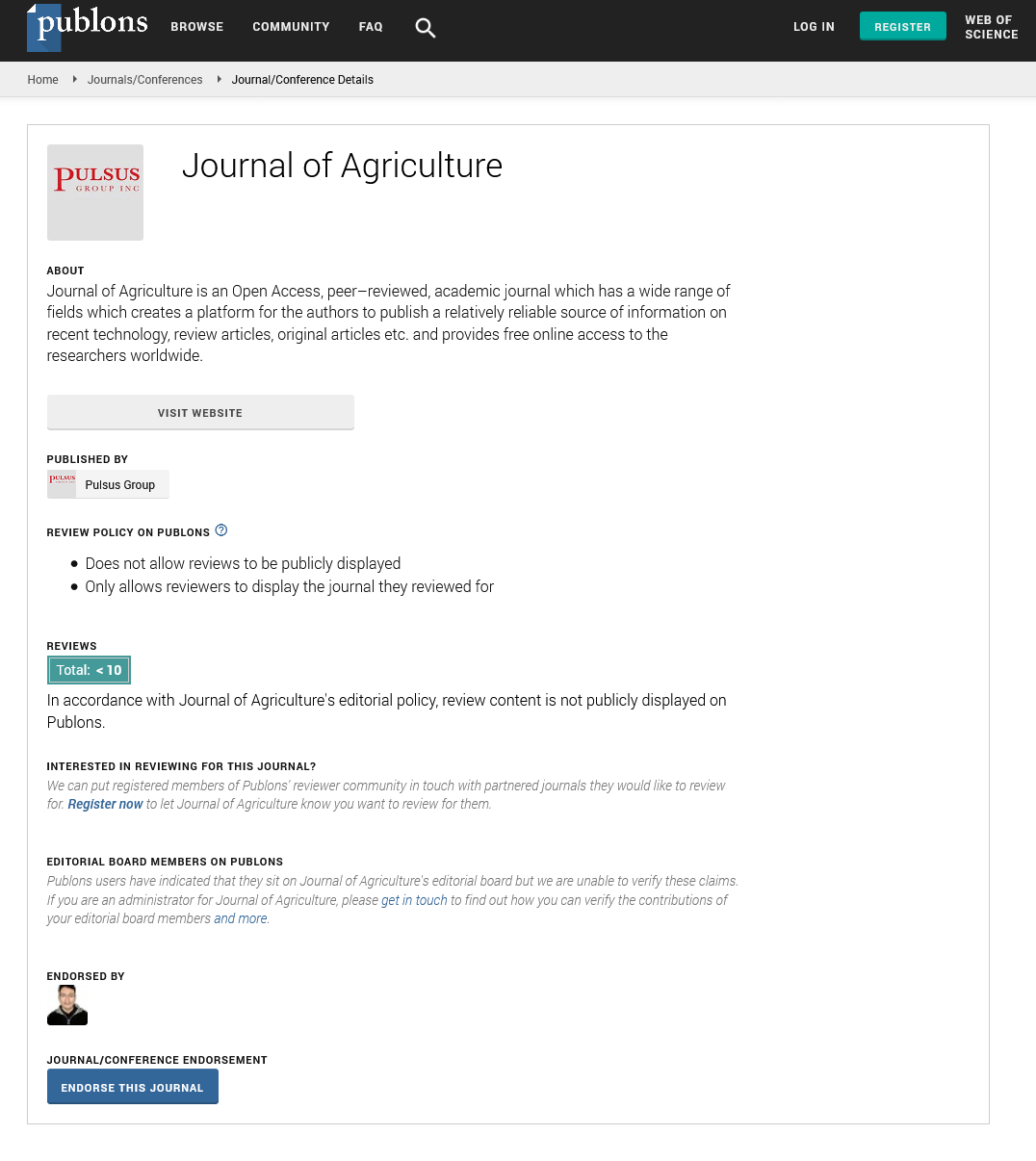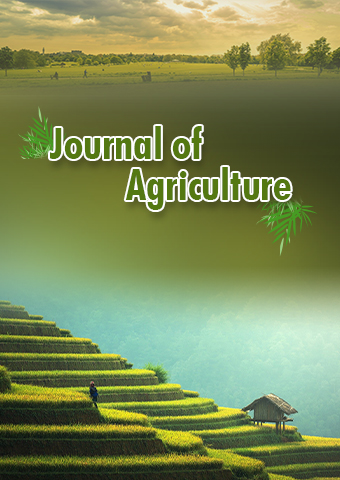Mini Review - Journal of Agriculture (2023) Volume 6, Issue 3
The Effects of Agricultural Technology and Their Potential to Revolutionize Agriculture
John Gupta*
Department of Agriculture, Agricultural University, India
Department of Agriculture, Agricultural University, India
E-mail: johongupta13@gmail.com
Received: 31-May-2023, Manuscript No. jagri-23-102484; Editor assigned: 02-Jun-2023, Pre-QC No. jagri-23-102484 (PQ); Reviewed: 16- Jun-2023, QC No. jagri-23-102484; Revised: 21-Jun-2023, Manuscript No. jagri-23-102484 (R); Published: 28-Jun-2023, DOI: 10.37532/ jagri.2023.6(3).61-63
Abstract
Agricultural technology has played a pivotal role in revolutionizing the global food production landscape, addressing the challenges posed by a growing population, climate change, and limited natural resources. This abstract provides an overview of the key advancements in agricultural technology, highlighting their impact on enhancing efficiency and sustainability in modern farming practices. The integration of digital technologies, such as precision agriculture, remote sensing, and Internet of things. This enabled farmers to optimize crop production through real-time monitoring and datadriven decision-making. Precision agriculture techniques, including soil sensors, drones, and autonomous machinery, have revolutionized farming practices, enabling targeted resource management, accurate application of fertilizers and pesticides, and efficient irrigation systems. These technologies have not only increased crop yields but also minimized environmental impact by reducing the use of inputs, preventing soil erosion, and improving water management. The development of genetically modified organisms (GMOs) and biotechnology has contributed significantly to agricultural productivity. Genetic engineering has facilitated the creation of crops with enhanced traits, such as drought resistance, disease tolerance, and increased nutritional value. These genetically modified crops have the potential to address food security challenges and reduce postharvest losses, ensuring a more reliable and abundant food supply. The utilization of data analytics and artificial intelligence (AI) has transformed the farming landscape. AIdriven algorithms analyse vast amounts of data, including weather patterns, historical yield data, and market trends, to provide farmers with valuable insights for optimizing their production processes. This data-driven approach enables farmers to make informed decisions, such as selecting the right crop varieties, optimizing planting schedules, and predicting disease outbreaks. As a result, agricultural operations become more efficient, reducing costs and resource wastage. Sustainable agriculture practices have gained significant attention in recent years. Innovations in agricultural technology have facilitated the adoption of organic farming methods, vertical farming, and aquaponics, enabling year-round crop production with reduced water consumption and minimal environmental impact.Furthermore, the integration of renewable energy sources, such as solar panels and wind turbines, in farming operations has contributed to energy selfsufficiency and reduced carbon emissions. Agricultural technology has emerged as a powerful tool in modern farming, addressing the challenges of food security, sustainability, and resource constraints. The integration of digital technologies, genetic engineering, data analytics, and sustainable farming practices has enhanced efficiency, productivity, and environmental stewardship in agriculture. Continued advancements in agricultural technology hold immense potential in ensuring a sustainable and secure future for global food production.
Keywords
Agricultural technology • Remote sensing • Soil sensors • Fertilizers • Organic farming methods • Food security
Introduction
Agriculture, the backbone of human civilization, has undergone remarkable transformations over the centuries. From the advent of simple hand tools to the introduction of mechanized farming, the industry has constantly evolved to meet the ever-growing demands of a global population. However, in the face of climate change, diminishing resources, and a growing need for sustainable practices, the agricultural sector is turning to technology to overcome these challenges [1, 2]. In this article, we will explore the impacts and promise of agricultural technology, also known as GTECH, in revolutionizing the way we grow, harvest, and manage crops.
Precision farming
One of the most significant advancements in agricultural technology is precision farming. By leveraging tools such as GPS, drones, and satellite imagery, farmers can now collect real-time data about their fields, enabling them to make informed decisions regarding irrigation, fertilization, and pest management [3]. Precision farming minimizes resource wastage, reduces costs, and maximizes crop yields, all while promoting environmental sustainability.
Smart irrigation
Water scarcity is a pressing issue in many regions worldwide, making efficient water usage essential in agriculture. Smart irrigation systems utilize sensors and weather data to optimize water delivery to crops based on their specific needs. These systems can detect moisture levels in the soil, evaporation rates, and weather patterns, ensuring that water is applied precisely when and where it is required. By avoiding over-irrigation, smart irrigation not only conserves water but also prevents nutrient leaching and reduces the energy required for pumping [4,5].
Vertical farming and controlled environment agriculture
As urbanization continues to accelerate, the availability of arable land for traditional farming diminishes. Vertical farming and controlled environment agriculture (CEA) offer innovative solutions to this challenge. Vertical farms employ stacked layers of plants grown in controlled environments with artificial lighting, temperature regulation, and nutrient delivery systems [6]. This approach allows for year-round cultivation, higher crop yields per square foot, and reduced dependency on pesticides and herbicides. CEA technologies can be implemented in urban areas, reducing transportation costs and ensuring fresh produce is available to local populations [7].
Robotics and automation
The integration of robotics and automation in agriculture has revolutionized laborintensive tasks. Robots can efficiently perform repetitive activities, such as planting, weeding, and harvesting, with precision and speed. These machines minimize the need for human intervention, increase productivity, and reduce costs associated with labor [8]. By automating mundane tasks, farmers can focus on higher-value activities, including data analysis, strategic planning, and innovation.
Biotechnology and genetic engineering
Biotechnology and genetic engineering play a vital role in enhancing crop characteristics and resilience. Scientists are developing genetically modified organisms (GMOs) that exhibit improved resistance to pests, diseases, and environmental stresses. Additionally, biotechnology enables the production of biofuels, bio-based materials, and environmentally friendly agricultural inputs. However, careful regulation and ethical considerations are necessary to ensure the safe and responsible use of these technologies [9].
Conclusion
Agricultural technology is transforming the way we produce food and manage resources, ushering in a new era of efficiency, sustainability, and productivity. Precision farming, smart irrigation, vertical farming, robotics, and biotechnology are just a few examples of the incredible innovations that are revolutionizing the agricultural sector. As technology continues to advance, it holds the promise of feeding a growing population, mitigating climate change impacts, and preserving our planet’s resources. However, it is crucial to balance the benefits of agricultural technology with ethical and environmental considerations, ensuring that the future of agriculture remains sustainable and resilient.
Result
Agricultural technology has played a significant role in improving crop yields. The use of precision agriculture techniques, such as satellite imagery, drones, and sensors, has enabled farmers to gather precise data on soil conditions, moisture levels, and crop health. This information helps them optimize the use of fertilizers, water, and pesticides, resulting in increased productivity and higher crop yields. Efficient Resource Management- Ag Tech solutions have allowed farmers to optimize the use of key resources such as water and fertilizers [10]. For instance, precision irrigation systems, including drip irrigation and soil moisture sensors, help deliver water directly to the roots of plants, minimizing water wastage. Similarly, smart fertilizer application methods, based on soil nutrient analysis, ensure that fertilizers are used in the right amount and at the right time, reducing environmental impact while maximizing crop growth.
References
- Forestier E, Grace J, Kenny C. Can information and communication technologies be pro-poor. Telecomm Policy. 26 (11), 623–646 (2002).
- Himesh S, Rao EP, Gouda KC et al. Digital revolution and Big Data: a new revolution in agriculture. CABI Reviews. 221-7(2018).
- Raj M, Shashank G, Vinay C et al. A survey on the role of Internet of Things for adopting and promoting Agriculture 4.0.J Netw Comput Appl. 187, 103-107(2021).
- Mousavi SR, Rezaei M. Nanotechnology in agriculture and food production. J Appal Environ Biol Sci.1 (10), 414-9(2011).
- Belmain S, Stevenson P. Ethnobotanicals in Ghana: reviving and modernising age-old farmer practice. Pesticide Outlook. 12(6), 233-238 (2001).
- Wingren G, Fredrikson M, Brage HN et al. Soft tissue sarcoma and occupational exposures. Cancer. 66, 806-811 (1990).
- Himesh S, Rao EP, Gouda KC et al. Digital revolution and Big Data: a new revolution in agriculture. CABI Reviews. 221-7(2018).
- Lahat G, Lazar A, Lev D et al. Sarcoma epidemiology and etiology: potential environmental and genetic factors. Surg Clin North Am. 88, 451-481 9 (2008).
- Adekola KA, Alabadan BA, Akinyemi TA. China Agricultural mechanization development experience for developing countries. J Agric Res Innov. 3(2), 655-8(2014).
- Zhao J, Li M, Gu D et al. Involvement of rice histone deacetylase HDA705 in seed germination and in response to ABA and abiotic stresses.Biochemical and Biophysical Research Communications.470, 439-444(2016).
Indexed at, Google Scholar, Crossref
Indexed at, Google Scholar, Crossref
Indexed at, Google Scholar, Crossref
Indexed at, Crossref, Google Scholar
Indexed at, Google Scholar, Crossref
Indexed at, Crossref, Google Scholar


